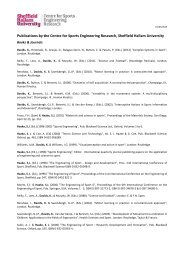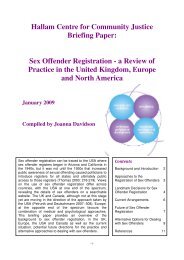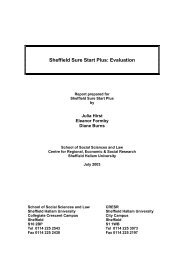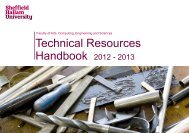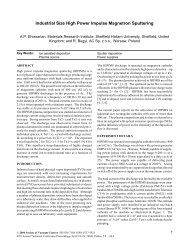The exercise of judicial discretion in rent arrears cases - Sheffield ...
The exercise of judicial discretion in rent arrears cases - Sheffield ...
The exercise of judicial discretion in rent arrears cases - Sheffield ...
Create successful ePaper yourself
Turn your PDF publications into a flip-book with our unique Google optimized e-Paper software.
Table 4: Tenants’ participation <strong>in</strong> hear<strong>in</strong>gs<br />
Forms <strong>of</strong> participation DCA 2004 Nixon et al 1996 SAUS 1986<br />
Tenant represented by<br />
solicitor/ duty desk<br />
22% 6% 8%<br />
Tenant attend<strong>in</strong>g <strong>in</strong><br />
person, but<br />
20%<br />
23%<br />
unrepresented<br />
34%*<br />
Written submissions<br />
only<br />
3%<br />
10%<br />
No participation by the<br />
tenant<br />
55% 62% 58%<br />
Total 100% 100% 100%<br />
*<strong>The</strong> SAUS study did not diffe<strong>rent</strong>iate between participation <strong>in</strong> the form <strong>of</strong> unrepresented attendance<br />
or by written submission.<br />
<strong>The</strong> court data <strong>in</strong>dicates a considerable change. <strong>The</strong> most strik<strong>in</strong>g is <strong>in</strong> the number <strong>of</strong><br />
tenants represented by a solicitor or duty desk. This can <strong>in</strong> part be expla<strong>in</strong>ed by the fact that<br />
all but one <strong>of</strong> the courts <strong>in</strong> this study had some form <strong>of</strong> duty desk available on possession<br />
days, compared with only half the courts <strong>in</strong> the 1996 study. Nonetheless <strong>in</strong> order to use the<br />
duty desk it is necessary for tenants to attend court and the figures do <strong>in</strong>dicate that there has<br />
been some success <strong>in</strong> improv<strong>in</strong>g participation, with the percentage <strong>of</strong> tenants fail<strong>in</strong>g to<br />
participate at all fall<strong>in</strong>g from 62% to 55%.<br />
<strong>The</strong> written forms which are sent to tenants (N11R) have been redrafted on a number <strong>of</strong><br />
occasions s<strong>in</strong>ce first <strong>in</strong>troduced. <strong>The</strong> percentage <strong>of</strong> those rely<strong>in</strong>g on these as their only form<br />
<strong>of</strong> participation has fallen from 10% to 3%. It may be that this is because <strong>of</strong> the greater level<br />
<strong>of</strong> attendance, so that those who previously were mak<strong>in</strong>g only written representations are<br />
now also attend<strong>in</strong>g. A further 8% also used a written response <strong>in</strong> addition to attend<strong>in</strong>g.<br />
Outcomes<br />
<strong>The</strong> pattern <strong>of</strong> outcomes for first hear<strong>in</strong>gs shows an <strong>in</strong>creased number <strong>of</strong> adjournments,<br />
generally <strong>in</strong> place <strong>of</strong> suspended possession orders. Given that the majority <strong>of</strong> <strong>cases</strong><br />
recorded were <strong>in</strong> London, which had a higher rate <strong>of</strong> adjournments than the other courts,<br />
some care must be taken with this comparison. <strong>The</strong> <strong>in</strong>creased use <strong>of</strong> adjournments is,<br />
however, also borne out by the outcomes <strong>in</strong> the <strong>cases</strong> assisted by the Legal Services<br />
Commission pilot duty desk schemes, where adjournments were obta<strong>in</strong>ed <strong>in</strong> 57% <strong>of</strong> <strong>cases</strong><br />
(Myers Wilson, 2004).<br />
17



